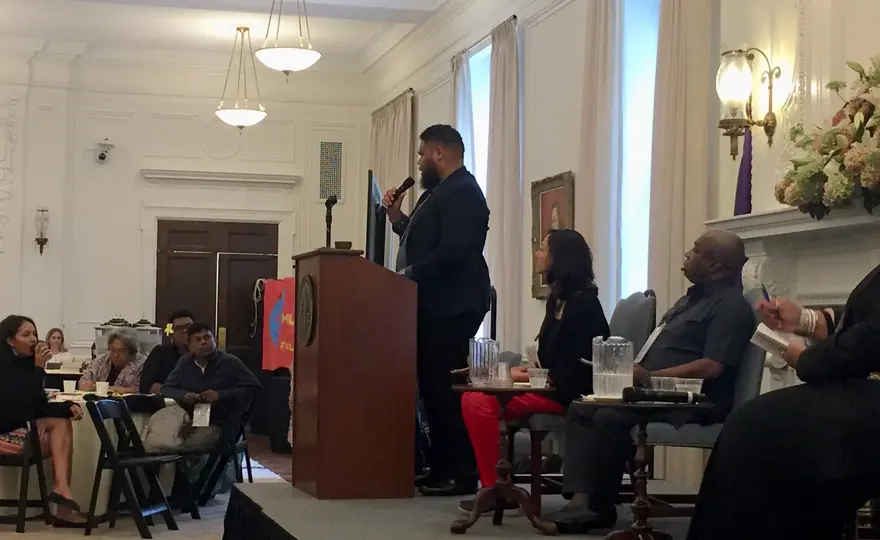ClientEarth Communications
19th September 2019


Kabay Tamu is one of eight Torres Strait Islanders taking a world-first human rights case against the Australian government for their inaction on climate change.
Ahead of the UN Climate Action Summit next week Kabay is in New York at the first ever global summit on human rights and climate change. As part of his visit, Kabay joined a panel at the Peoples’ Summit on Climate, Rights and Human Survival, discussing the connections between the climate crisis, human rights, and justice. They shared stories of human rights impacts of climate change from participants living in or working with communities on the frontlines of the climate crisis.
Read more
“Hello everyone, I’d like to say thank you for the opportunity to be here with so many inspirational people around the world, working on such an important topic for us all.
It is also amazing to be here in New York. It’s worth mentioning that just on the way here, the subway carriage I travelled in had more people than my whole island.
You might not have heard about the region where I’m from. I’m from the Torres Strait Islands, which is a group of Australian islands off the north coast of Australia, between Australia and Papua New Guinea.
As a proud Warraberalgal man from the Kulkalgal nation, I’m here today to talk about the urgency of the climate situation for my islands and all of the islands across the Torres Strait.
My home is a vast wilderness area that includes the most northerly part of the Great Barrier Reef. It is home to marine reserves, traditional fishing areas and rare species under our stewardship such as turtles and dugongs.
Our islands have been continuously inhabited by indigenous people for tens of thousands of years.
But the climate crisis is endangering all of this.
Rising seas caused by man-made climate change are threatening homes, swamping burial grounds and washing away sacred cultural sites. As we watch the steady erosion of our coastlines, we witness communities being inundated, infrastructure damaged, sea walls and flood defences breached, fresh water wells contaminated and plants and crops spoiled.
Rising sea temperatures are also affecting the marine environments we rely on.
We are witnessing more coral bleaching and ocean acidification. This is damaging the reefs and marine life that are vital for the ecosystem. The urgency of the situation is clear.
If these climate impacts continue, we fear that – without urgent action – our islands could be uninhabitable in our lifetimes.
We, as a people, are connected to these islands through our cultural practices and traditions. If our connection to these lands disappears, our indigenous culture disappears.
With science showing evidence of yet more sea level rise, we would expect the Commonwealth of Australia to be ramping up its efforts to tackle climate change for the sake of its indigenous communities, its newer arrivals, as well as the global community.
Indeed Australia punches far above its weight when it comes to greenhouse emissions. Not only does Australia have one of the highest per capita carbon footprints in the world but, as you are no doubt aware, recent studies have shown that when fossil fuel exports are taken into account, Australia’s total greenhouse gas emissions amounts for approximately five percent of the world’s total emissions. If business as usual continues, Australia’s emissions are expected to rise to 17% of the world’s total.
It is because of Australia’s lack of meaningful action to reduce its emissions, as well as the devastating impact the climate crisis is having on our culture, that we have made a formal complaint to the United Nations Human Rights Committee.
Australia has one of the world’s worst track records for climate inaction and it is currently violating its legal obligation to Torres Strait people.
Under the UN treaty, we have the right to culture and the right to family.
These rights are under threat from the Australian government’s lack of climate action and its failure to help our communities adapt.
The Australian government needs to recognise its obligation to this country’s first nations people. We need the resources to protect our homes from climate change.
Climate justice means recognising that the Torres Strait contributed the least to climate change but are feeling its effects the most.
This isn’t a problem for other countries to tackle. Our leaders need to understand their responsibility to indigenous Australians who are on the climate frontline.
This issue is about giving the original landowners of Australia, the legal voice to speak up against an injustice that will only get louder unless we stop it.”
When asked what climate justice means for him, Kabay replied:
“Climate justice for me means firstly greater recognition of the continued colonialization of climate change.
Australia has a difficult history in relation to its indigenous peoples.
And we are seeing that the government is continuing to fail its first nation peoples by not acting on climate with the urgency needed.
We need governments, both Australia and around the world, to recognise that the indigenous people who are most at risk of climate breakdown, did the least to contribute to the problem.
And to provide them with the power and resources to adapt to the climate impacts we’re already seeing.”
We are supporting Kabay and his fellow Torres Strait Islanders to bring their case against the Australian government. If you want to add your voice to the fight, you can sign the islanders’ petition calling on the Australian to do more to tackle climate change and protect the Torres Strait Islands.